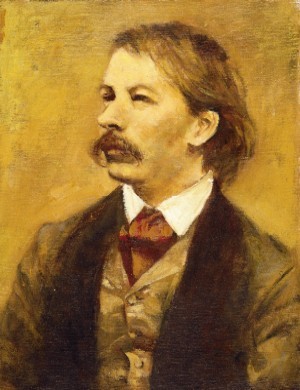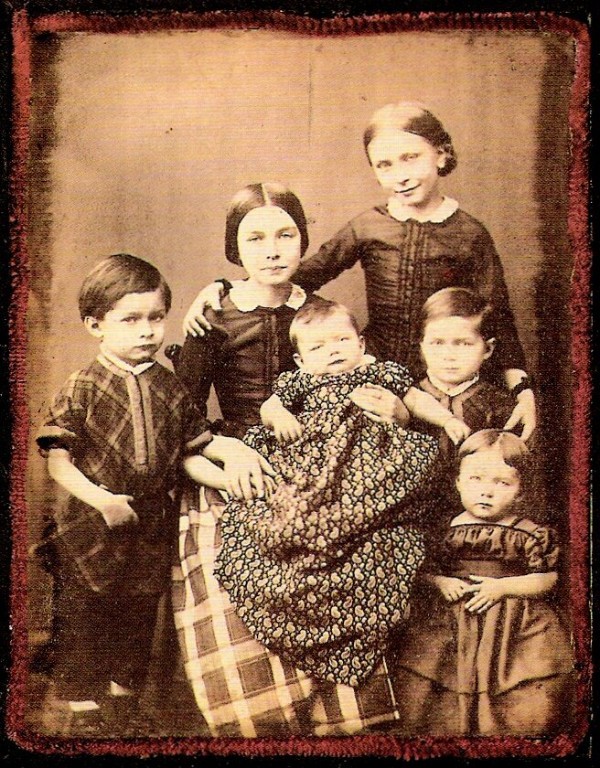Roses are gorgeously beautiful flowers, and they are associated with romantic love and beauty. And as far back as I can remember, which isn’t really all that long, the rose has been one of the most recognized symbols of Valentine’s Day. The rose is called the “Queen of Flowers,” and red roses are a symbol of love and romance, while white roses are symbolic of innocence, purity, honor, and reverence.
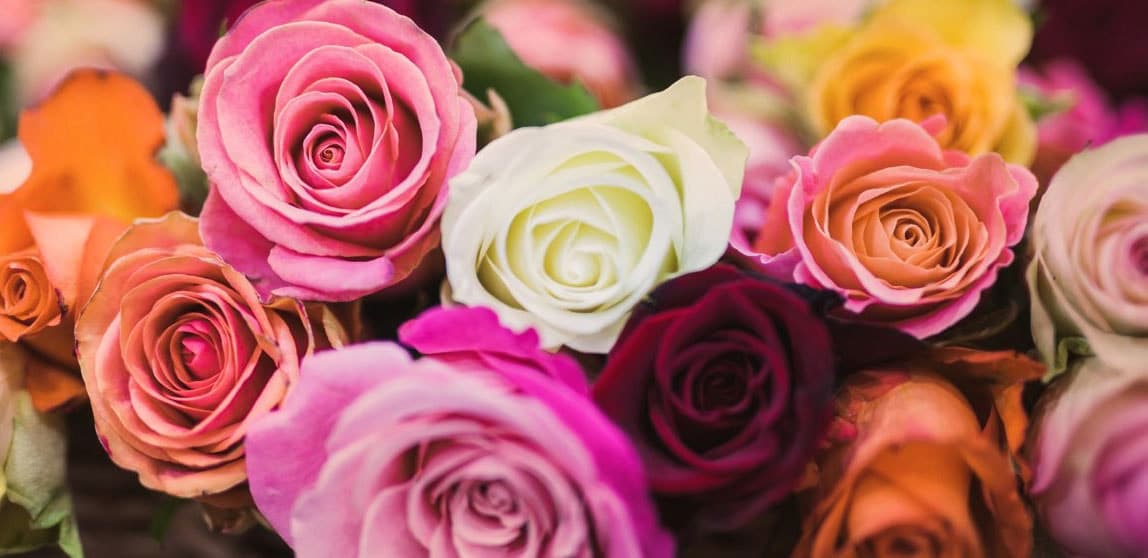
And while we’re talking about colors, pink roses are symbols of grace and elegance, expressing admiration and joyfulness. A yellow rose is a symbol of friendship with feelings of warmth and happiness, while orange roses mean desire, enthusiasm, and passionate romance. Regardless of color, the flower is said to be more than 35 million years old, and humans have been cultivating them for more than 5,000 years.
Robert Schumann: The Pilgrimage of the Rose, Op. 112 – Part I: Die Fruhlingslufte bringen … (Britta Stallmeister, soprano; Antonia Bourvé, soprano; Olivia Vermeulen, mezzo-soprano; Daniel Behle, tenor; Tobias Berndt, baritone; Chorus Musicus Koln; Das Neue Orchester; Christoph Spering, cond.)
Robert Schumann: The Pilgrimage of the Rose, Op. 112 – Part I: Johannis war gekommen (Britta Stallmeister, soprano; Antonia Bourvé, soprano; Olivia Vermeulen, mezzo-soprano; Daniel Behle, tenor; Tobias Berndt, baritone; Chorus Musicus Koln; Das Neue Orchester; Christoph Spering, cond.)
Robert Schumann: The Pilgrimage of the Rose, Op. 112 – Part I: Wir tanzen (Britta Stallmeister, soprano; Antonia Bourvé, soprano; Olivia Vermeulen, mezzo-soprano; Daniel Behle, tenor; Tobias Berndt, baritone; Chorus Musicus Koln; Das Neue Orchester; Christoph Spering, cond.)

Rose window at Notre-Dame de Paris
Given that the rose is such an important and influential flower, it goes without saying that it has a long cultural history attached. In Greek mythology, the rose is said to have been the creation of the goddess Aphrodite, a deity associated with love, lust, beauty, pleasure, passion, and procreation. It supposedly all came about when her lover Adonis was mortally wounded, Aphrodite wounded herself on a thorn of a rose and stained the entire flower red with her blood. There are many more interesting stories of the rose in Greek mythology, and some of them were taken over by the ancient Romans. There the rose was associated with the goddess of love, Venus. It is said that the Roman God, Zephyrus, transformed himself into a rose in an effort to seduce Flora, the Goddess of flowers. I don’t know if he was successful, but roses had symbolic meaning in everyday life for Romans. A wild rose placed outside a door meant that secret matters were being discussed inside.
Robert Schumann: The Pilgrimage of the Rose, Op. 112 – Part I: Und wie sie sangen (Britta Stallmeister, soprano; Antonia Bourvé, soprano; Olivia Vermeulen, mezzo-soprano; Daniel Behle, tenor; Tobias Berndt, baritone; Chorus Musicus Koln; Das Neue Orchester; Christoph Spering, cond.)
Robert Schumann: The Pilgrimage of the Rose, Op. 112 – Part I: So sangen sie (Britta Stallmeister, soprano; Antonia Bourvé, soprano; Olivia Vermeulen, mezzo-soprano; Daniel Behle, tenor; Tobias Berndt, baritone; Chorus Musicus Koln; Das Neue Orchester; Christoph Spering, cond.)
When we talk about roses as a tool for seduction, we can’t forget to mention Cleopatra. Initially, Isis, the Goddess of magic and life was associated with the rose, and Cleopatra is said to have covered the floors of her palace chamber with thousands of rose petals in an effort to seduce Marc Antony. We can say with some degree of certainty that she did indeed succeed. Vishnu supposedly created Lakshmi, the Hindu goddess of wealth, good fortune, youth, and beauty, from rose petals. I didn’t know that roses are native to Persia and its nearby territories, but I read somewhere that the yellow Persian rose reached Vienna in the 16th century, and “from there slowly gained prominence across Europe and the world.
Robert Schumann: The Pilgrimage of the Rose, Op. 112 – Part I: Bin ein armes Waisenkind (Britta Stallmeister, soprano; Antonia Bourvé, soprano; Olivia Vermeulen, mezzo-soprano; Daniel Behle, tenor; Tobias Berndt, baritone; Chorus Musicus Koln; Das Neue Orchester; Christoph Spering, cond.)
Robert Schumann: The Pilgrimage of the Rose, Op. 112 – Part I: Es war der Rose erster Schmerz! (Britta Stallmeister, soprano; Antonia Bourvé, soprano; Olivia Vermeulen, mezzo-soprano; Daniel Behle, tenor; Tobias Berndt, baritone; Chorus Musicus Koln; Das Neue Orchester; Christoph Spering, cond.)
Robert Schumann: The Pilgrimage of the Rose, Op. 112 – Part I: Wie Blatter am Baum (Britta Stallmeister, soprano; Antonia Bourvé, soprano; Olivia Vermeulen, mezzo-soprano; Daniel Behle, tenor; Tobias Berndt, baritone; Chorus Musicus Koln; Das Neue Orchester; Christoph Spering, cond.)

Mother Mary
Christianity associated the rose with the Virgin Mary, and the rose symbol eventually led to the creation of the rosary and other devotional prayers. The rose became a favorite subject in art and music, and if you have been clicking on the music links above, you have been listening to a “very charming fairy-tale Idyll” by Robert Schumann entitled The Pilgrimage of the Rose. It’s not a historical account, but a thorny tale of a rose who becomes human to experience the joys of love and motherhood. The storyline tells of the elf “Rose,” who requests to be sent to earth. She is warned many times of the dangers of experiencing the world of human beings but to no avail. As a miller’s daughter, however, she experiences the joys of human existence, culminating in love, marriage, and mother- hood. When she dies during childbirth, she is allowed to enter the heavens as an angel.
Robert Schumann: The Pilgrimage of the Rose, Op. 112 – Part I: Die letze Scholl’ hinunter rollt (Britta Stallmeister, soprano; Antonia Bourvé, soprano; Olivia Vermeulen, mezzo-soprano; Daniel Behle, tenor; Tobias Berndt, baritone; Chorus Musicus Koln; Das Neue Orchester; Christoph Spering, cond.)
Robert Schumann: The Pilgrimage of the Rose, Op. 112 – Part I: Dank, Herr, dir dort im Sternenland (Britta Stallmeister, soprano; Antonia Bourvé, soprano; Olivia Vermeulen, mezzo-soprano; Daniel Behle, tenor; Tobias Berndt, baritone; Chorus Musicus Koln; Das Neue Orchester; Christoph Spering, cond.)
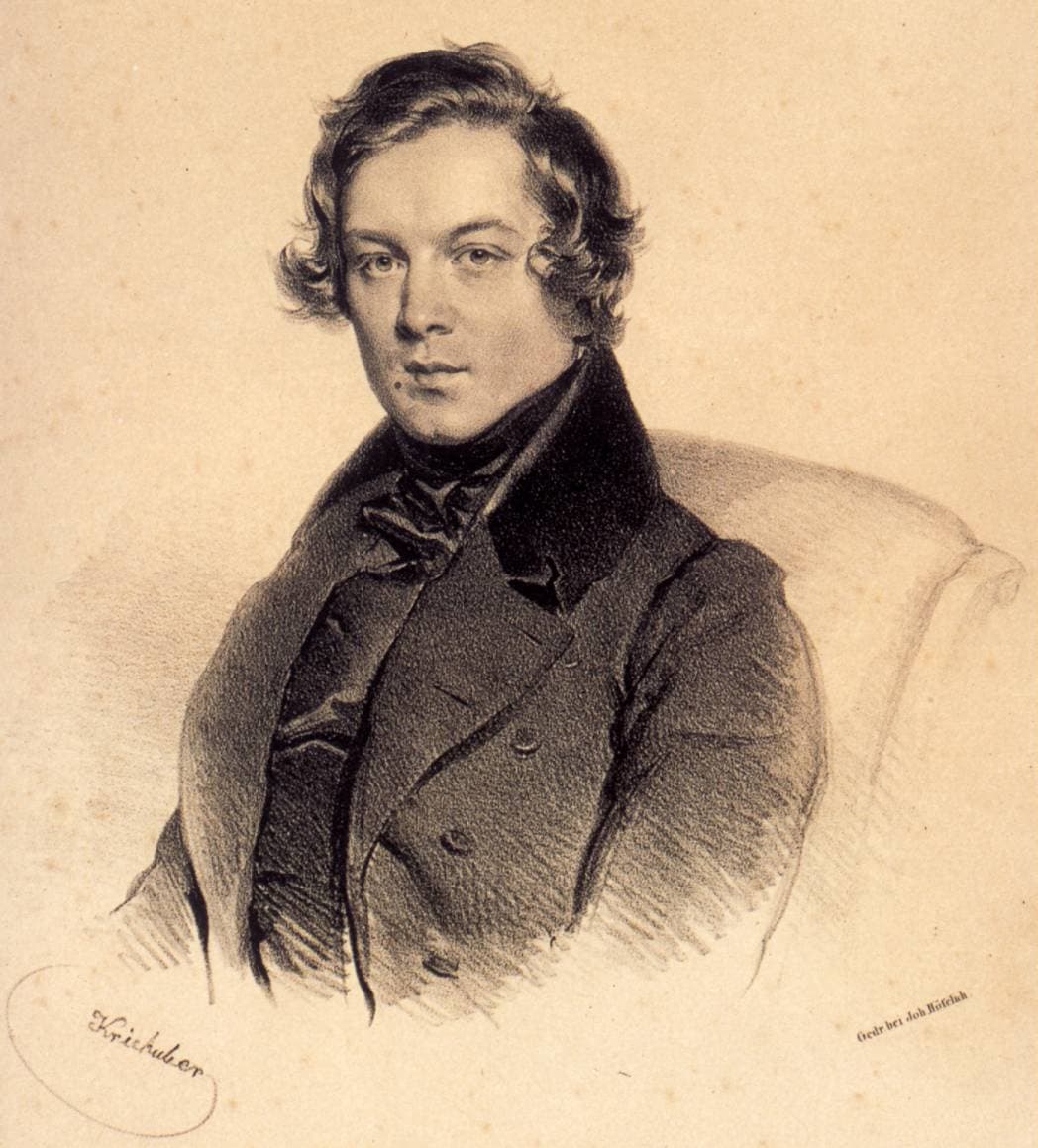
Robert Schumann, 1839
In the spring of 1851, Schumann received a letter from the lawyer turned poet Moritz Horn, asking him to consider a fairytale in verse he had just written. Schumann was enthusiastic, and responded, “Your poem is certainly suitable for a musical setting, and many melodies have already come to mind. But it would have to be shortened considerably, and much of it treated more dramatically… I should be delighted to set up the work. It is so alive and fresh in my mind that the sooner you make these changes the better.
Robert Schumann: The Pilgrimage of the Rose, Op. 112 – Part II: Ins Haus des Totengrabers (Britta Stallmeister, soprano; Antonia Bourvé, soprano; Olivia Vermeulen, mezzo-soprano; Daniel Behle, tenor; Tobias Berndt, baritone; Chorus Musicus Koln; Das Neue Orchester; Christoph Spering, cond.)
Robert Schumann: The Pilgrimage of the Rose, Op. 112 – Part II: Zwischen grunen Baumen (Britta Stallmeister, soprano; Antonia Bourvé, soprano; Olivia Vermeulen, mezzo-soprano; Daniel Behle, tenor; Tobias Berndt, baritone; Chorus Musicus Koln; Das Neue Orchester; Christoph Spering, cond.)
Horn apparently made the changes very quickly because a couple of weeks later Clara Schumann reports, “Despite the unbearable street noises in our apartment, Robert is still composing so much wonderful music. This month he wrote ‘Der Rose Pilgerfahrt’ for soprano, alto, tenor, bass, and small chorus with piano accompaniment, to a poem by a man from Chemnitz named Horn”. The basic story outline, according to some mean critics, “represents German Romanticism at its most sickly sweet.” It seems to me, however, that Schumann liked folk stories, Teutonic rustic aesthetics, and moral idealism. And he must certainly have been aware of the opportunity for picturesque choral scenes.
Robert Schumann: The Pilgrimage of the Rose, Op. 112 – Part II: Von dem Greis geleitet (Britta Stallmeister, soprano; Antonia Bourvé, soprano; Olivia Vermeulen, mezzo-soprano; Daniel Behle, tenor; Tobias Berndt, baritone; Chorus Musicus Koln; Das Neue Orchester; Christoph Spering, cond.)
Robert Schumann: The Pilgrimage of the Rose, Op. 112 – Part II: Bald hat das neue Tochterlein … (Britta Stallmeister, soprano; Antonia Bourvé, soprano; Olivia Vermeulen, mezzo-soprano; Daniel Behle, tenor; Tobias Berndt, baritone; Chorus Musicus Koln; Das Neue Orchester; Christoph Spering, cond.)
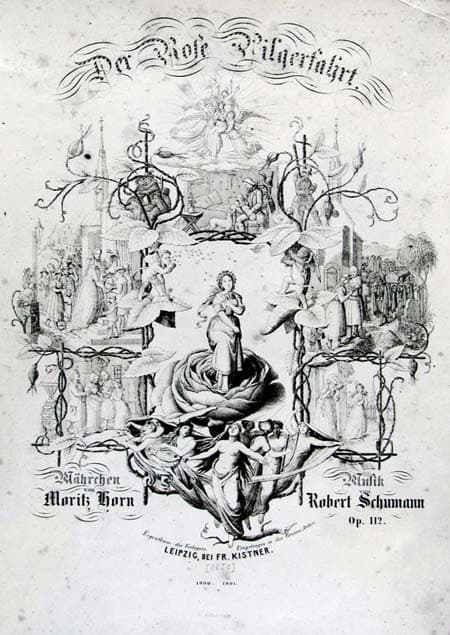
Robert Schumann: The Pilgrimage of the Rose
And Schumann certainly had a performance medium in mind. His family had left Dresden for Düsseldorf, where he had been appointed municipal music director. The Schumanns loved being in the Rhineland, and for the first time in his professional career, Robert “had an enthusiastic amateur choir and a well-trained orchestra at his disposal.” Besides composing a number of orchestral compositions and chamber works, Schumann regularly rehearsed and directed a group of around thirty singers, the so-called “Singkränzchen.” They met once every fortnight at the house of one or other of the members to perform lieder, operatic numbers, and pieces with keyboard accompaniment.
Robert Schumann: The Pilgrimage of the Rose, Op. 112 – Part II: Bist du im Wald gewandelt (Britta Stallmeister, soprano; Antonia Bourvé, soprano; Olivia Vermeulen, mezzo-soprano; Daniel Behle, tenor; Tobias Berndt, baritone; Chorus Musicus Koln; Das Neue Orchester; Christoph Spering, cond.)
Robert Schumann: The Pilgrimage of the Rose, Op. 112 – Part II: Im Wald, gelehnt am Stamme … (Britta Stallmeister, soprano; Antonia Bourvé, soprano; Olivia Vermeulen, mezzo-soprano; Daniel Behle, tenor; Tobias Berndt, baritone; Chorus Musicus Koln; Das Neue Orchester; Christoph Spering, cond.)
Robert Schumann: The Pilgrimage of the Rose, Op. 112 – Part II: Der Abendschlummer … (Britta Stallmeister, soprano; Antonia Bourvé, soprano; Olivia Vermeulen, mezzo-soprano; Daniel Behle, tenor; Tobias Berndt, baritone; Chorus Musicus Koln; Das Neue Orchester; Christoph Spering, cond.)
In July 1851 the work was performed in a private setting, and Schumann writes, “that it made a very agreeable impression.” He was urged to orchestrate the work to make it accessible to a wider audience. “Schumann undertook the orchestration reluctantly, partly because, as he wrote to Horn, the piano accompaniment seemed to him quite sufficient for the delicate subject matter, partly because he was anxious to plunge into new projects.” As it happens, the instrumentation was one of the features most admired when Schumann performed the work in February 1852, with Joseph Joachim and Franz Liszt in the audience.
Robert Schumann: The Pilgrimage of the Rose, Op. 112 – Part II: Wer kommt am Sonntagsmorgen … (Britta Stallmeister, soprano; Antonia Bourvé, soprano; Olivia Vermeulen, mezzo-soprano; Daniel Behle, tenor; Tobias Berndt, baritone; Chorus Musicus Koln; Das Neue Orchester; Christoph Spering, cond.)
Robert Schumann: The Pilgrimage of the Rose, Op. 112 – Part II: Ei Muhle, liebe Muhle … (Britta Stallmeister, soprano; Antonia Bourvé, soprano; Olivia Vermeulen, mezzo-soprano; Daniel Behle, tenor; Tobias Berndt, baritone; Chorus Musicus Koln; Das Neue Orchester; Christoph Spering, cond.)
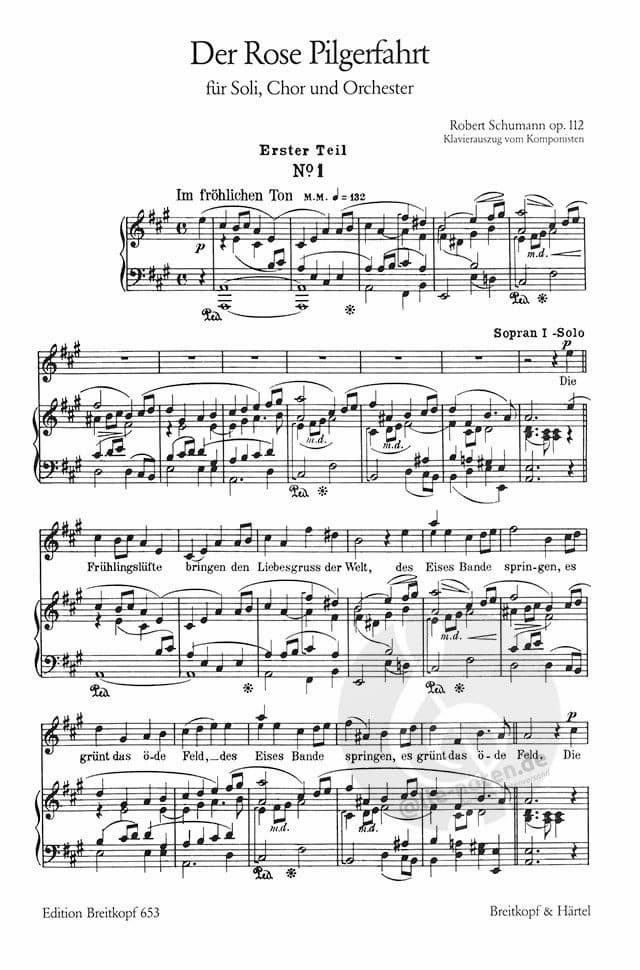
Robert Schumann: Der Rose Pilgerfahrt
On a more technical note, this secular oratorio seems to develop a new approach to music drama. To some scholars, “it is a musical bridge connecting song, oratorio, and music theatre.” As in his other secular oratorio, Das Paradies und die Peri, which is based on a Persian legend of vaguely religious heroism, the soloists act alternately as narrators and protagonists. “And Schumann enhances the work’s continuity by linking many of the twenty-four numbers by means of a single held note in the orchestra.”
Robert Schumann: The Pilgrimage of the Rose, Op. 112 – Part II: Was klingen denn die Horner … (Britta Stallmeister, soprano; Antonia Bourvé, soprano; Olivia Vermeulen, mezzo-soprano; Daniel Behle, tenor; Tobias Berndt, baritone; Chorus Musicus Koln; Das Neue Orchester; Christoph Spering, cond.)
Robert Schumann: The Pilgrimage of the Rose, Op. 112 – Part II: Im Hause des Mullers … (Britta Stallmeister, soprano; Antonia Bourvé, soprano; Olivia Vermeulen, mezzo-soprano; Daniel Behle, tenor; Tobias Berndt, baritone; Chorus Musicus Koln; Das Neue Orchester; Christoph Spering, cond.)
A critic writes, “once we get past the cynicism the last 150 years have forced upon us, perhaps we can escape into idealized fantasy, and become intoxicated with the heady perfumes of the Pilgrimage of the Rose, refreshing ourselves for the moment in innocence and purity.” In a way, that’s exactly what we are doing every Valentine’s Day, as we forget about the trials and tribulations of life to remember, for a brief moment, the purity of love. Schumann just knew how to wrap it all up in a fairytale, and the penultimate number represents the climax of the work. A year has gone by, and Rose has born a child. At the height of her happiness, she chooses to pass the magic rose on to her child, thereby sacrificing her own life. The closing chorus is filled with the fluttering of wings and a gorgeous chorus of angelic voices as the singers celebrate Rose’s final transfiguration. Happy Valentine’s!
For more of the best in classical music, sign up to our E-Newsletter
Robert Schumann: The Pilgrimage of the Rose, Op. 112 – Part II: Und wie ein Jahr verronnen ist … (Britta Stallmeister, soprano; Antonia Bourvé, soprano; Olivia Vermeulen, mezzo-soprano; Daniel Behle, tenor; Tobias Berndt, baritone; Chorus Musicus Koln; Das Neue Orchester; Christoph Spering, cond.)
Robert Schumann: The Pilgrimage of the Rose, Op. 112 – Part II: Roslein! … (Britta Stallmeister, soprano; Antonia Bourvé, soprano; Olivia Vermeulen, mezzo-soprano; Daniel Behle, tenor; Tobias Berndt, baritone; Chorus Musicus Koln; Das Neue Orchester; Christoph Spering, cond.)

